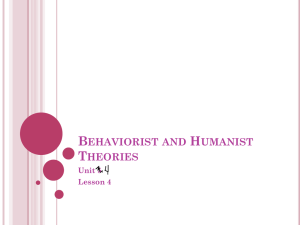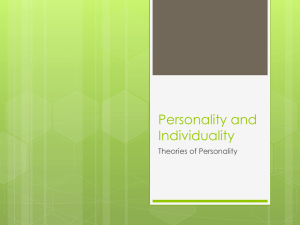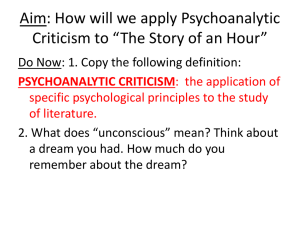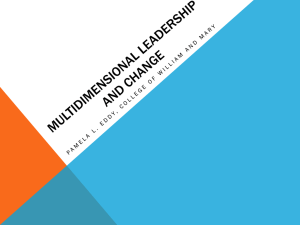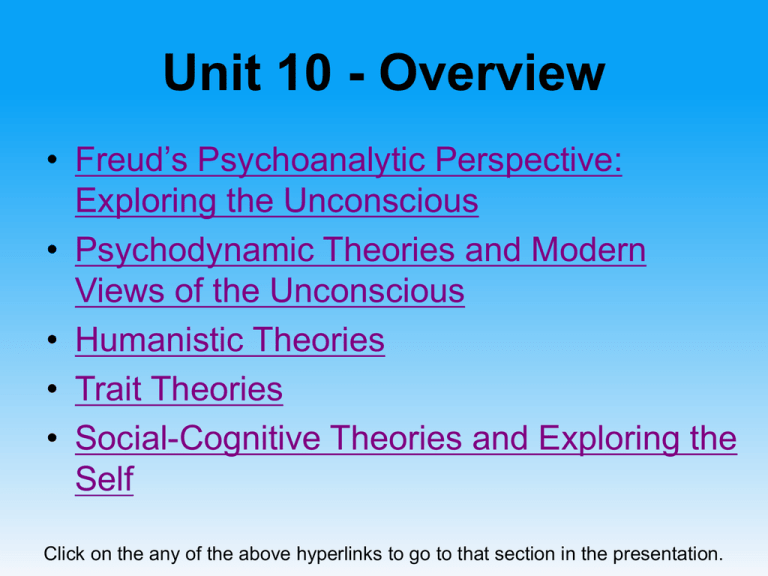
Unit 10 - Overview
• Freud’s Psychoanalytic Perspective:
Exploring the Unconscious
• Psychodynamic Theories and Modern
Views of the Unconscious
• Humanistic Theories
• Trait Theories
• Social-Cognitive Theories and Exploring the
Self
Click on the any of the above hyperlinks to go to that section in the presentation.
Module 55:
Freud’s Psychoanalytic Perspective:
Exploring the Unconscious
Introduction
• Personality
Psychoanalytic Theory’s Core
Ideas
Psychoanalytic Theory’s Core
Ideas
• Parts of the mind
–Conscious
–Preconscious
–Unconscious
• Free association
• Psychoanalysis
• Repression
Psychoanalytic Theory’s Core Ideas
Personality Structure
• Personality structure
–Id
• Pleasure
principle
–Ego
• Reality
principle
–Superego
• conscience
Psychoanalytic Theory’s Core Ideas
Personality Development
• Psychosexual stages
–Oral
–Anal
–Phallic
–Latency
–Genital
Psychoanalytic Theory’s Core Ideas
Personality Development
Psychoanalytic Theory’s Core Ideas
Personality Development
•
•
•
•
•
•
Erogenous zones
Oedipus complex
Electra complex
Identification
Gender identity
Fixation
Psychoanalytic Theory’s Core Ideas
Defense Mechanisms
• Defense mechanisms
– Repression
– Regression
– Reaction formation
– Projection
– Rationalization
– Displacement
– Sublimation
– Denial
Evaluating Freud’s
Psychoanalytic Perspective
Evaluating Freud’s
Psychoanalytic Perspective
• Contradictory Evidence
• Is repression a myth?
• Modern challenges to repression
Module 56:
Psychodynamic Theories and
Modern Views of the Unconscious
The Neo-Freudian and
Psychodynamic Theorists
The Neo-Freudian and
Psychodynamic Theorists
• Psychodynamic theory
• Neo-Freudians
–Adler’s inferiority complex
–Horney’s sense of
helplessness
–Jung’s collective unconscious
Assessing Unconscious
Processes
Assessing Unconscious
Processes
• Projective Test
–Thematic Apperception Test (TAT)
–Rorschach Inkblot Test
The Modern Unconscious
Mind
The Modern Unconscious
Mind
• False consensus effect
• Terror
management
theory
Module 57:
Humanistic Theories
Introduction
• Humanistic Theories
Abraham Maslow’s SelfActualizing Person
Abraham Maslow’s SelfActualizing Person
• Abraham Maslow
–Self-actualization
–Self-transcendence
–Peak experiences
Carl Rogers’ Person-Centered
Perspective
Carl Rogers’ Person-Centered
Perspective
• Carl Rogers
–Growth promoting climate
• Genuineness
• Acceptance
• Empathy
–Unconditional
positive regard
–Self-concept
Assessing the Self
Assessing the Self
• Self-report tests
• Ideal versus
actual self
Evaluating Humanistic
Theories
Evaluating Humanistic
Theories
• Renewed interest in self-concept
• Criticisms
–Vague and
subjective
–Individualistic and
Western biased
–Naïve
Module 58:
Trait Theories
Exploring Traits
Exploring Traits
• Trait
–Describing rather
than explaining
–Myers-Briggs Type
Indicator (MBTI)
Exploring Traits
Factor Analysis
• Factor analysis
–Eysenck and Eysenck
• Extroversion versus introversion
• Emotional stability versus instability
• Eysenck Personality Questionnaire
Exploring Traits
Factor Analysis
Exploring Traits
Biology and Personality
• Brain scans
–Brain arousal
• Genetics
–Autonomic nervous
system reactivity
Assessing Traits
Assessing Traits
• Personality inventory
–Minnesota Multiphasic Personality
Inventory (MMPI)
• Empirically derived test
• Objective test
• Lie scale
The Big Five Factors
The Big Five Factors
• The Big Five
–Conscientiousness
–Agreeableness
–Neuroticism
• Emotional stability
vs instability
–Openness
–Extraversion
Evaluating Trait Theories
Evaluating Trait Theories
The Person-Situation Controversy
• Person-situation controversy
–Are traits
consistent?
–Can traits
predict
behavior?
Module 59:
Social-Cognitive Theories and
Exploring the Self
Social-Cognitive Theories
Social-Cognitive Theories
• Social-cognitive perspective
–behavioral approach
Social-Cognitive Theories
Reciprocal Influences
• Reciprocal determinism
Social-Cognitive Theories
Reciprocal Influences
• Ways individuals and the
environment interact
– Different people choose different
environments
– Out personalities shape how we interpret
and react to events
– Our personality help create situations to
which we react
Social-Cognitive Theories
Optimism versus Pessimism
• Optimism and Health
• Excessive Optimism
• Blindness to one’s
own incompetence
• Positive psychology
Social-Cognitive Theories
Assessing Behavior in Situations
• US Army spy training
• Business use of simulations
Social-Cognitive Theories
Evaluating Social-Cognitive
Theories
• Based on research
• Focuses too much on the
situation
Comparing the Major
Personality Theories
Exploring the Self
Exploring the Self
• Self
–Possible
selves
–Spotlight
effect
Exploring the Self
The Benefits of Self-Esteem
• Self-esteem
• Self-efficacy
Exploring the Self
Self-Serving Bias
• Self-serving bias
–People accept more responsibility
for good deeds than for bad,
successes than failures
–Most people see themselves as
better than average
• Defensive self-esteem
• Narcissism
Exploring the Self
Culture and the Self
• Individualism
• Collectivism
Exploring the Self
Culture and the Self

